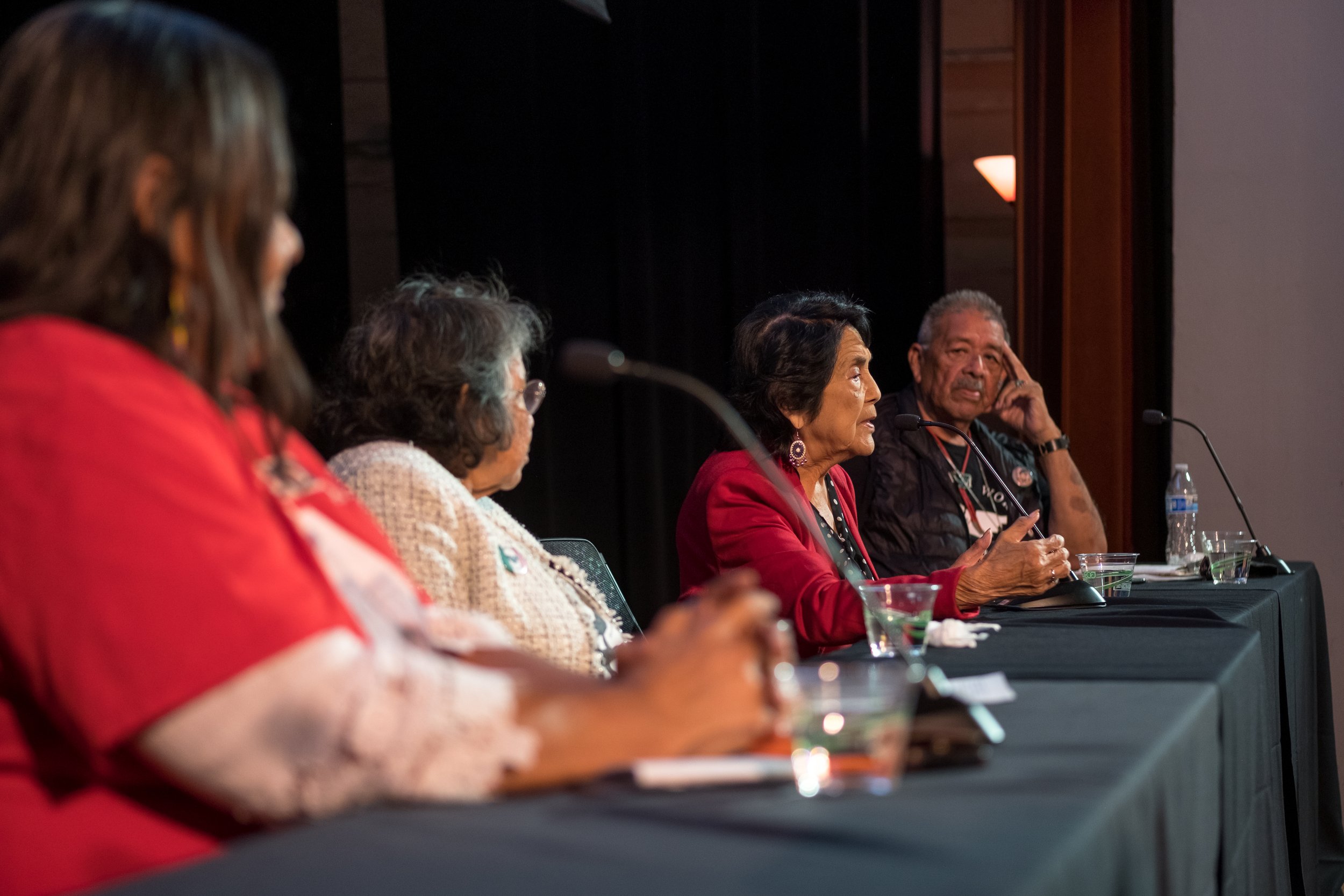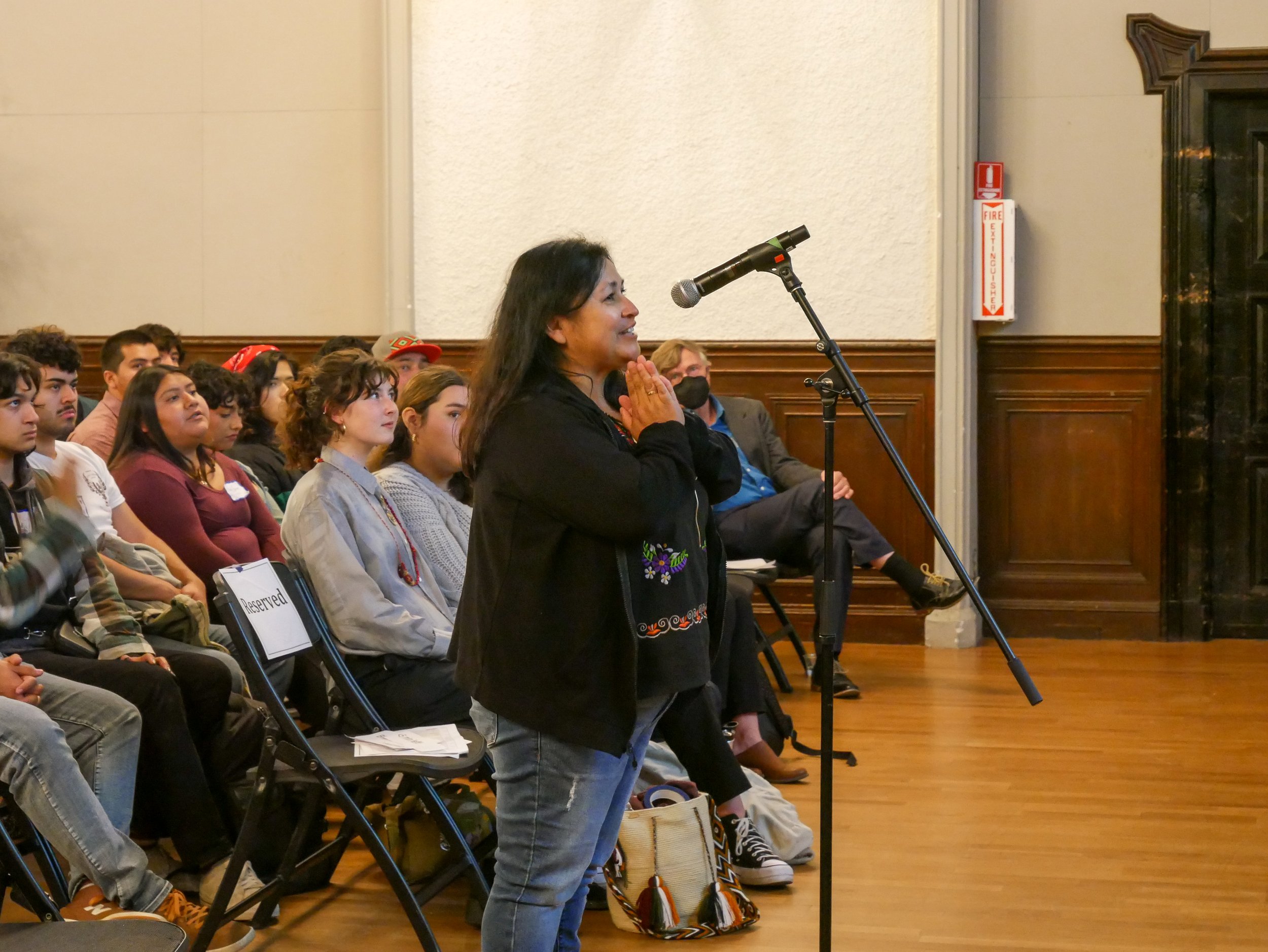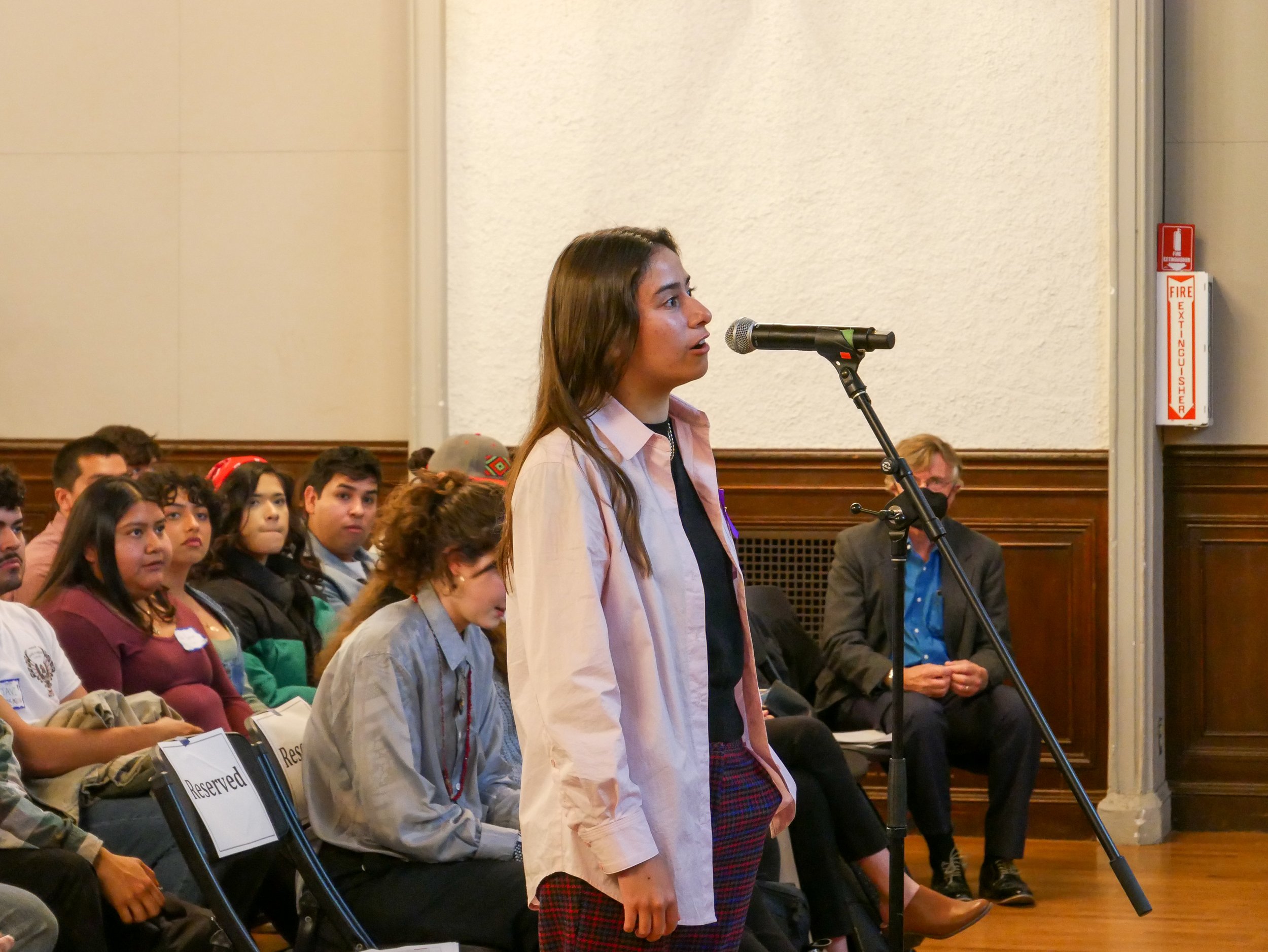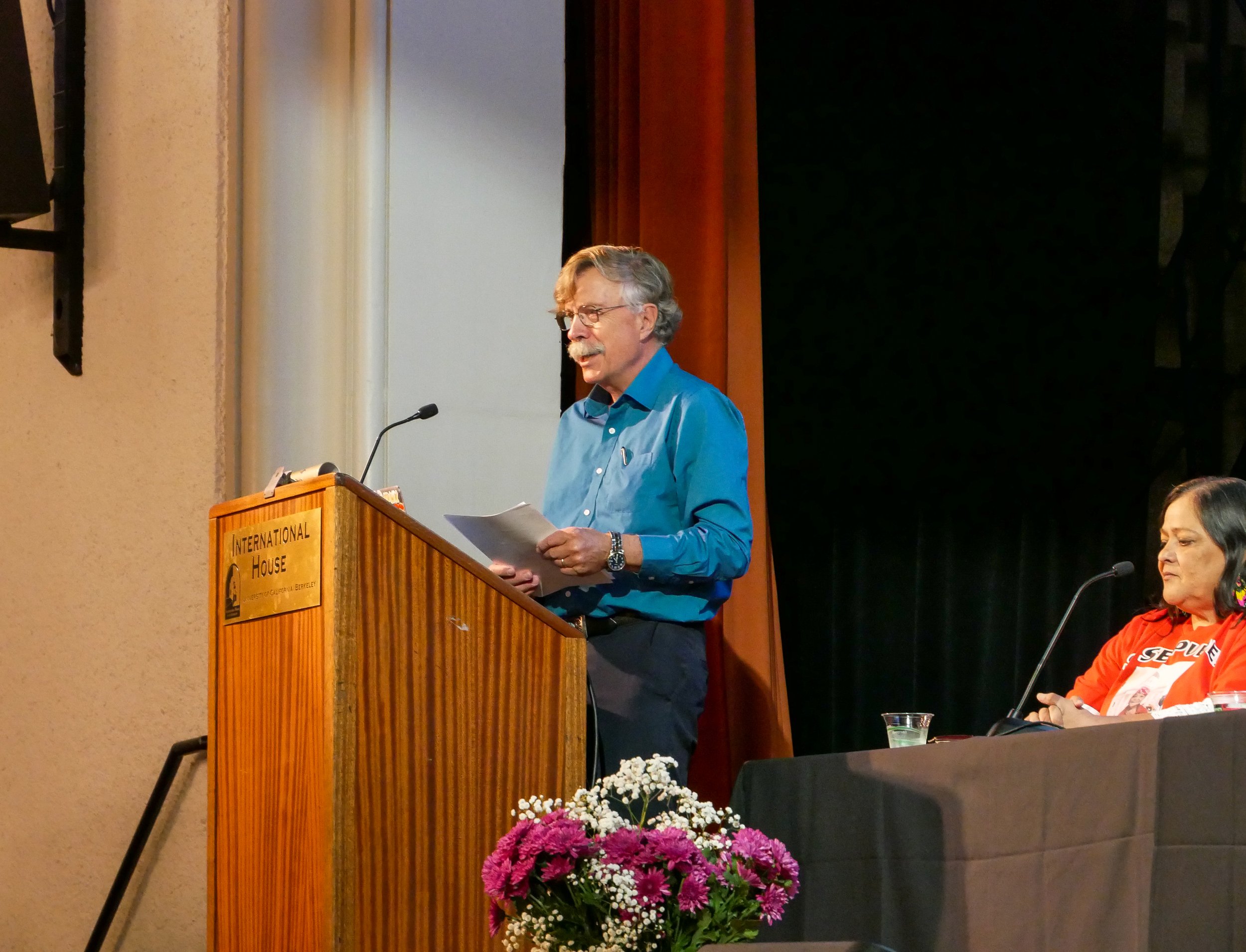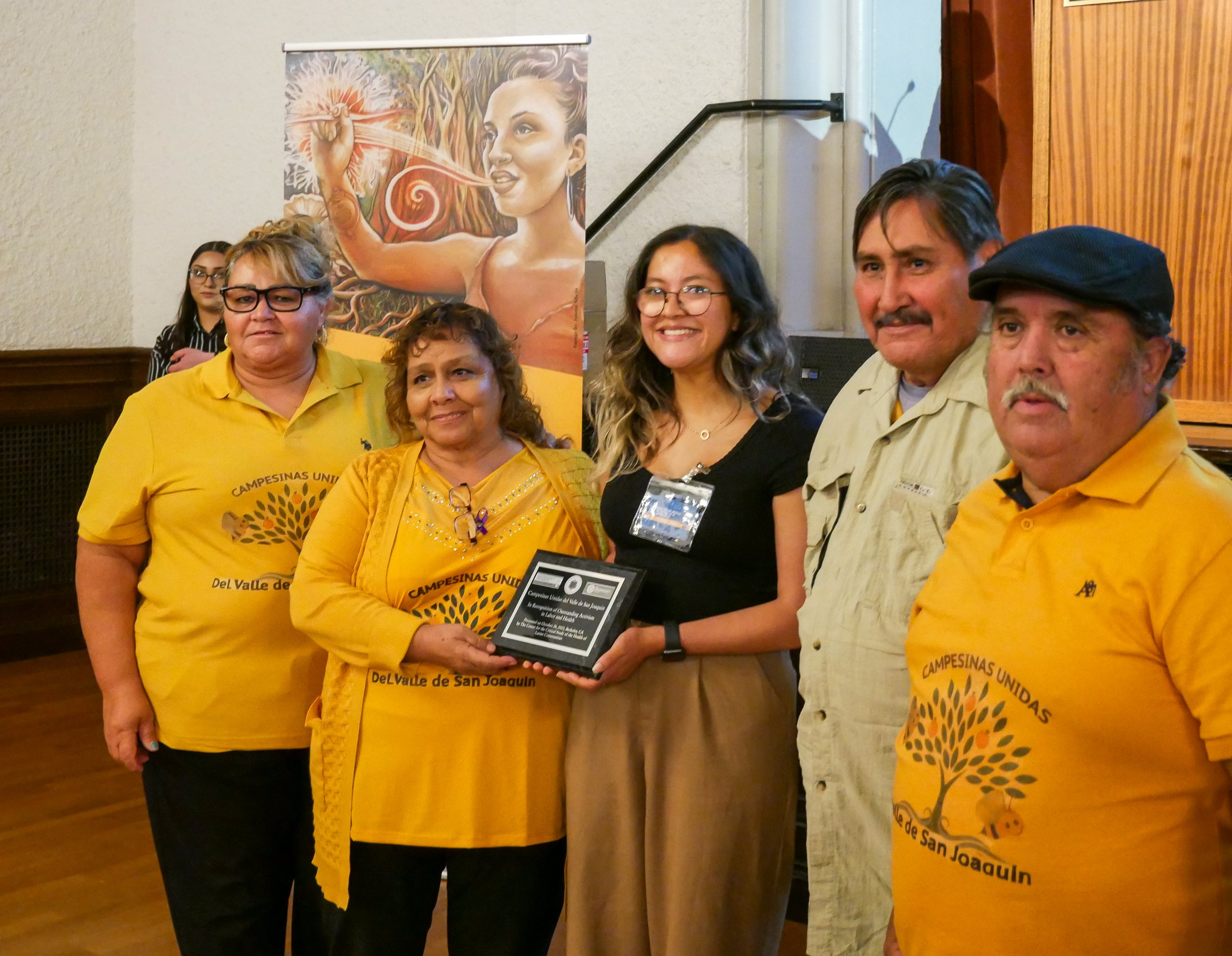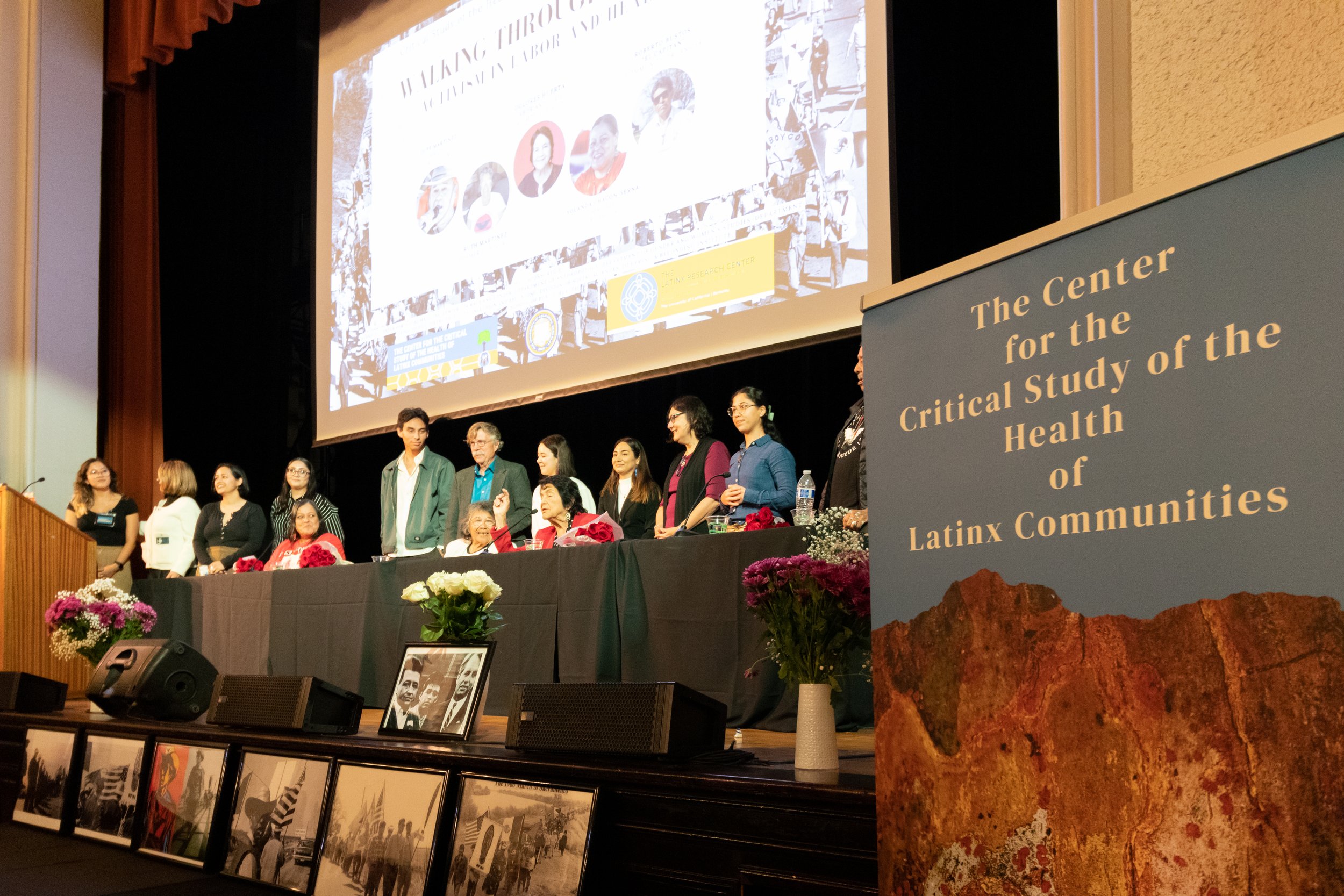Walking Through History
October 26, 2023
An Evening Celebrating Latinx contributions to Labor and Health
Left to Right: Dr. Clara Mantini-Briggs, Ruth Martinez, Dolores Huerta
With over 350 people in attendance, ‘Walking Through History: Activism in Labor and Health’ brought together four farmworker activists to talk about current labor conditions, and to inspire a new generation of activists to carry on their work. Participating in this special panel were, Dolores Huerta, Ruth Martinez, Roberto Bustos (‘El Capitan’), and Yolanda Chacon-Serna. Also present at this special event were representatives from the Central Valley Empowerment Alliance, Campesinas Unidas del Valle Central, Sequoia College. These activists came to the farmworker movement at different moments in their life and in different capacities—more importantly, they have continued their fight for farmworker rights for decades with the United Farm Workers (UFW).
In the spirit of UFW organizing, a deep sense of community was present during this event. With each introduction, the UFW unity clap, which was used to close meetings and bridge language gaps, welcomed our distinguished guests to UC Berkeley– taking almost forty-five minutes. Throughout the event, the audience became more enthralled by their recounting of why they became community organizers–how the words and ideas of Cesar Chavez infused their own spirits to accompany him and fight against the injustices of the moment.
I continue to do the work that Cesar left us. I even, I even say every other day I say, ‘Cesar, you rest now, we got this. We'll do it from here on, we'll work on it.’ I made a promise to him that I will continue his legacy and the legacy of the farm workers.
— Roberto ‘El Capitan’ Bustos
Dolores Huerta is a living civil rights icon, through her work in the United Farmworkers movement and more recently through the Dolores Huerta Foundation, she has diligently fought for the rights of farm workers and continues to organize underserved Latinx communities in her fight for social justice. During the Q&A, audience members spoke of their grandparents marching alongside Huerta and Cesar Chavez and how that had influenced them today. Huerta reflected on the importance of the democratic process,“this is the only game in town.” Huerta spoke adamantly about how necessary it is for young people to stay involved and to vote, but also about how it’s through the democratic process that rights will be recognized. Boycotting, striking, all of that is simply part of a process to get written legislation that legally secures the rights of marginalized people.
Huerta also spoke extensively about the state of current U.S politics and the need to check the power of large global corporations that seek to exploit and oppress workers. Through her stories Huerta conveyed to the audience the importance of solidarity in organizing— the issues farmworkers face in small rural communities in California are the same issues faced by farm workers all over the world. This is something that we have the power to change.
You know, to go out there and say, we can win through non-violence. We have an army right here, right here, sitting right here. An army of organizers, an army of volunteers to spread that message out there. The message of peace and justice and respect for each other.
— Dolores Huerta
Ruth Martinez, a retired nurse and UFW activist, spoke eloquently about her memories during that time, and the lessons she learned from Cesar Chavez. The audience could almost feel his presence in the room as Martinez spoke from the heart about her work during the Grape Strike of 1966. Martinez was a young woman when she started her work as an activist and going on to spend decades fighting for farmworker rights serving as a source of inspiration for students to continue the fight.
“I took care of a lot of the farmers' feet when they got blistered and everything, and all the people that passed out because of the heat or the, uh, struggle. And Cesar always said, if you struggle and you fight for what you want, no one can take anything away from you. And that's true. I learned that from a very young age. That as long as I worked and I struggled and tried, I would be able to do whatever I wanted to do. And, I wanted to help the farm workers.”
— Ruth Martinez
Roberto Bustos, a UFW march captain and activist, is a great storyteller. During the panel, Bustos shared the history between him and Cesar Chavez and how he came to be ‘El Capitan’ during the March to Sacramento. Within the first few minutes of the event, his whistle, hearty laugh, and strong voice displayed his character as “El Capitan.” More importantly, Bustos told stories to the audience of his long career and extensive experience in advocacy –a reminder that the 1966 Grape Strike trained and empowered a new generation of Latinx activists and community organizers.
When given the opportunity by Cesar Chavez, Bustos stepped up. He knew the journey would be hard, but he was determined to see it through. Bustos’ passion could be felt by every audience member. As he spoke fondly of Cesar Chavez, there is no doubt he was inspiring a new generation of labor activists.
“And we slept out there in the grass. And that's the way it was happening all through the march: 25 days, 400 miles to reach Sacramento. April 10th, 1966, we made it. They mentioned there were 77 of us. Yes, we started with 77 of us. 77 took the pledge. And I was one of them. And Cesar told me, “Roberto, I want you to be the captain. I want you to lead the March to Sacramento.” I said, “Oh, no, no, not me. No, no. Get somebody else. No, no. They,” I told 'em, “they won't listen to me.” Well, [said Cesar Chavez] “No, they, they will, they will. I’ve seen you working and they know you'll be a good one.” So he put me in charge.”
— ‘El Capitan’ Roberto Bustos
Yolanda Chacon-Serna, a labor organizer and healthcare advocate, led the audience into chant throughout the event—a powerful reminder that she had been raised in the movement. During her time on the panel, Chacon-Serna shared insights into her extensive experience as an activist and community organizer through her knowledge on unionizing, health administration, and voter registration.
It became clear that Chacon-Serna had emerged as a leader, carrying on the legacy of the UFW. The rhythm with which she spoke was like a beating drum. How many feet had marched to her powerful words? It is with this power Chacon-Serna was able to mobilize and inspire the audience.
“It's a unity. That's what you call solidarity. Everybody pitching in, everybody doing their part. We each one, teach one, each one, reach one! Caesar said, “we don't need a perfect political system, we need perfect participation.” So… if somebody calls you, get involved, volunteer, do visibility, register people to vote. We are the ones who are important in making the decision about policies, by electing the right people. When we don't get involved, we're victims and victimized, but we don't agonize, we organize! Right?!”
—Yolanda Chacon-Serna
Q&A
During the Q&A, audience members reflected on the personal significance of the movement for them. Undergraduate attendees recalled hearing stories of the strike from family elders. One student in the audience took the opportunity to reflect on the honor of hearing from panelists that had participated in the strike with his grandfather, who passed away before he had the opportunity to meet him.
The Q&A also offered an opportunity to reflect on how to continue the work the UFW started today. As an audience member, it truly felt like one was being transported into the 1966 Grape Strike. People were there not only to learn, but to participate in what felt like a spiritual moment in history. The chance to engage with these panelists was a once and a lifetime event for many, and would likely not be forgotten. It wasn’t just a recalling of facts, but the retelling of a story—an emotional gathering that left many inspired and energized to carry on the work of our distinguished panelists.
Watch the event here!
Speakers
Dolores Huerta
Dolores Huerta, a co-founder of the United Farm Workers Association, stands as one of the preeminent labor activists of the 20th century and a prominent figure in the Chicano civil rights movement. Huerta played a pivotal role in orchestrating the 1965 Delano strike, which saw 5,000 grape workers participating, and subsequently led negotiations for the workers' contract. Throughout her tenure with the UFW, Huerta undertook the organization of laborers, facilitated contract negotiations, and tirelessly advocated for enhanced workplace safety, including the eradication of hazardous pesticides. Huerta also fought for unemployment and healthcare benefits for agricultural workers. Huerta continues her work as founder and president of the Dolores Huerta Foundation, traveling across the country to support equality and defend civil rights.
Roberto ‘El Capitan’ Bustos
Roberto Bustos, born in Eloy, Arizona, overcame a challenging upbringing working in the fields, starting at the age of 10, and later moved to California with his family in search of a better life. Inspired by a meeting with Cesar Chavez, Roberto and his brother became passionate advocates for farmworkers' rights. At just 23 years old, he became the leader of the historic March to Sacramento in 1966, which started with 77 participants and grew to over 1,500 by the time they reached the state Capitol. Beyond his role in the United Farm Workers, Roberto dedicated over three decades to promoting community health in Tulare County, focusing on HIV and STD prevention among farmworkers. His life stands as a testament to unwavering commitment to justice and equity for farmworkers and community health.
Lupe Martinez
Lupe Martinez is an activist and former farmworker. Lupe began working as a farmworker in the fields of the San Joaquin Valley under various farm labor contractors. It was during this period, while working in the grape fields, that he crossed paths with organizers from the United Farm Workers, including Cesar Chavez. This encounter ignited a deep passion within Lupe for organizing and pursuing justice, a passion that would stay with him throughout his life. Lupe Martinez’s has served as an organizer, contract administrator, negotiator, regional direct, and national organizing director for the United Farm Workers. Since retiring from the Union he embarked on a new chapter in his organizing, including working at the Center on Race, Poverty & the Environment (CRPE) addressing environmental justice issues within farm working communities. Lupe Martinez's life has been marked by a commitment to social justice, workers' rights, and environmental justice. His journey continues to inspire and uplift those who follow in his footsteps, reaffirming the transformative power of activism and the enduring pursuit of justice.
Ruth Martinez
Ruth Martinez, originally from Green River, Wyoming, found her calling as a community organizer in Ducor, San Joaquin Valley. Her journey into activism began through her marriage to a UFW-involved farm worker, driven by the harsh field conditions and health impacts of pesticides on her daughter. Encouraged by César Chávez, Ruth pursued nursing, dedicating 30 years to the profession while actively participating in UFW marches. After moving to Ducor, Ruth tackled water supply challenges, leading successful campaigns to transition to community ownership. She continued her activism by advocating for clean water access, pesticide buffer zones, and sewage line installations. Today, Ruth remains a dedicated community activist, championing regional water issues, supporting UFW-related political campaigns, and serving as a testament to the enduring impact of grassroots activism.
Yolanda Chacon-Serna
Yolanda, growing up in the 1960s in Delano, California, was immersed in a culture of activism from a young age, which paved the way for her decades-long journey as a labor organizer and community advocate. At just 7 years old, she participated in Cesar Chavez's historic march from Delano to Sacramento alongside her activist mother, setting the stage for her tireless advocacy for farmworkers' rights. As a labor organizer, Yolanda has worked with AFL–CIO (American Federation of Labor and Congress of Industrial Organizations), one of the largest and most influential labor federations in the United States, reflecting her unwavering commitment to workers' rights and her dedication to creating better working conditions for laborers across various industries. As a passionate healthcare advocate, she serves as the Board Secretary of Omni Family Health, a federally-funded network of healthcare centers providing primary and preventative healthcare to individuals and families across Kern, Kings, Tulare, and Fresno counties.
Co-sponsored by:
Berkeley Center for Social Medicine, Center for Race and Gender, Department of Anthropology, Department of Gender and Women's Studies, Department of Sociology, Office of Diversity, Equity, Inclusion and Belonging, Division of Social Sciences, Othering & Belonging Institute, School of Public Health
This event was in-person and recorded. A recording will be uploaded to our YouTube page. To be notified when the recording is available, please sign up for our newsletter.
Credits
A special thank you to undergraduate research assistant Anais Ramos who helped plan, coordinate and support this event.
Written by undergraduate research assistant: Anaïs Roatta
Page design: Carolina Talavera
Photography by: Diego Montesinos, Jimena Romano Silva, Abraham Ramirez
This event would not have been possible without our team of undergraduate research assistants, the LRC team, including the Democracy & Media team, the Decolonial Knowledges & the Pluriversal team, and the Latino Democracy Cluster team.


